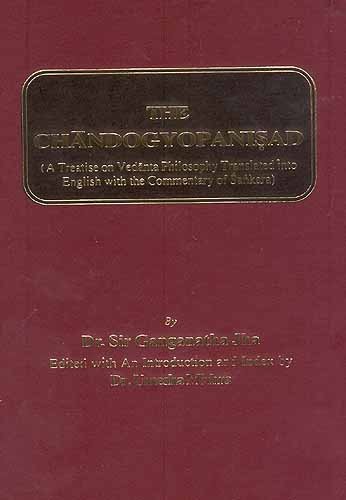Chandogya Upanishad (Shankara Bhashya)
by Ganganatha Jha | 1942 | 149,749 words | ISBN-10: 8170842840 | ISBN-13: 9788170842842
This is the English translation of the Chandogya Upanishad, an ancient philosophical text originally written in Sanksrit and dating to at least the 8th century BCE. Having eight chapters (adhyayas) and many sub-sections (khandas), this text is counted among the largest of it's kind. The Chandogya Upanishad, being connected to the Samaveda, represen...
Section 4.4 (fourth khaṇḍa) (five texts)
Upaniṣad text:
It is said that Satyakāma Jābāla addressed his mother: ‘Mother, I wish to live the life of the Religious Student; of what family am I?’—(1)
Commentary (Śaṅkara Bhāṣya):
Now begins the teaching that ‘all this universe in the form of speech and the rest, and Agni and the rest, which has been hitherto eulogised as Food and Food-eater, should be unified and divided into sixteen, parts and viewed as Brahman. The story has been introduced with a view to show that Faith and Austerity are necessary adjuncts of meditation on Brahman.
Satyakāma—by name;—the particle ‘ha’ is meant to indicate the fact of the story being correct;—Jābāla—the son of Jabālā—addressed his mother—Jabālā—O, mother, I wish to live the life of the Religious Student,—in the family of a Teacher,—for the purpose of acquiring the Vedic Lore; —to which family do I belong—what is the name of the Ṛṣi to whose race I belong?’.
Upaniṣad text:
She said to him—‘I do not know, my child’ of what family thou art; I obtained thee when, in my youth, I attended upon many people, devoted to their service; so I do not know of what family thou art; but I am Jabālā by name and thou art Satyakāma by name; so declare thyself as Satyakāma Jābālā.’—(2)
Commentary (Śaṅkara Bhāṣya):
Being thus asked, Jabālā said to her son: ‘I do not know the Ṛṣi to whose family you belong, O, my child.’—Being asked—‘Why do you not know it’?—She said—‘In my husband’s house, I had to attend upon many people who came as guests and strangers,—as servant—very devoted to my duties of attendance on them, and being entirely taken up by such service, my mind never turned towards such information as regards the family to which thou belongest, which therefore I do not remember;—and it was at that time, in my youth that I obtained thee;—and soon after your father died; hence, having no protector left for myself, I know not to which family thou belongest. But I am Jabālā by name and thou art Satyakāma by name; so declare thyself to thy Teacher—as Satyakāma Jābāla saying ‘I am Satyakāma Jābāla’;—that is, if you are asked by the Teacher’.—(2)
Upaniṣad text:
Having gone to Gautama-Hārīdrumata, he said to him—‘Reverend Sir, I wish to live as a Religious Student under you, and I would approach you, reverend Sir.’—He said to him ‘Of what family art thou, my Boy?’—He replied—‘Sir, I do not know of what family I am; I asked my mother and she said—‘I obtained thee when, in my youth, I attended upon many people, devoted to their service; so I do not know of what family thou art; but I am Jabālā by name and thou art Satyakāma by name;’—so, Sir, I am Satyakāma-Jābāla.—(3-4)
Commentary (Śaṅkara Bhāṣya):
He, Satyakāma-Jābāla, having gone to Hārīdrumata—the son of Haridrumata—Gautama, being his family name, said to him—‘Reverend Sir, I wish to live as a Religious Student under you,—and live with you,—I would approach you. Sir,—as a disciple’.—When he said this, Gautama said to him—‘Of what family art thou, my Boy?’—as a disciple has to be admitted only when his family and race are fully known.
Being thus asked, Satyakāma said—‘Sir, I do not know of what family I am; but I asked my mother; and on being asked by me, my mother said to me—‘In my youth, I attended upon many people etc., etc.,’—as before. I remember her words; so, Sir, I am Satyakāma-Jābāla.—(3-4)
Upaniṣad text:
He said to him—‘None but a Brāhmaṇa could thus speak out. Fetch the fuel, good boy, I shall initiate thee; thou hast not flinched from the truth’.—Having initiated him he selected four hundred lean and weak cows and said to him—‘Good boy, go with these’—While taking them away, he said—‘I would not return without a thousand’.—He dwelt away for a number of years, by which time the cows came to be a thousand.—(5)
Commentary (Śaṅkara Bhāṣya):
Gautama said to him—‘No one who is not a Brahmana could speak out so openly and straightforwardly; It is Brāhmaṇas alone, not others, who are, by their very nature, straight-forward. Since thou hast not flinched from the truth—which is the rightful duty of the Brāhmaṇa-caste, I accept thee as a Brāhmaṇa and am going to initiate thee; hence for the purpose of the preparatory embellishment, fetch fuel, my Boy, for the fire-rites.
Having said this, he initiated him, and having selected out of his herd of cattle—four hundred lean and weak cows, said to him ‘My boy, go with these cows’. Being thus told, the Boy, while taking them away to the forest,—said, ‘I would not return until a thousand cows are completed’. Having said this, he took the cows to the forest, where there was plenty of grass and water and no extremes (dangers)—and dwelt away there for a number of years,—i.e. for a long time; till the cows, having been properly looked after, came to be one thousand,—complete.—(5)
End of Section (4) of Discourse IV.
